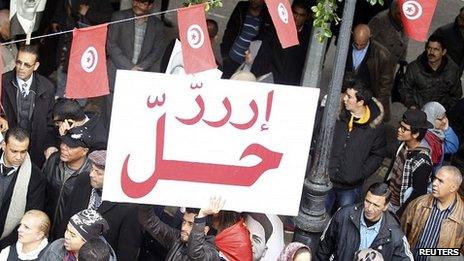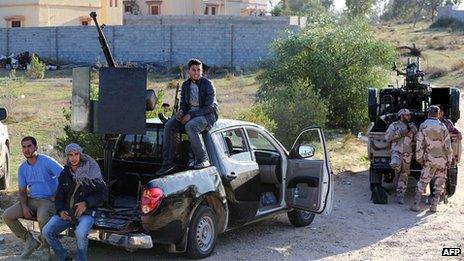Hard winter for the Arab Spring
- Published

Trade union protesters in Tunis hold a sign saying "leave"
Tunisian poet Aboul Qacem Echebbi once penned these lines in his country's national anthem:
"When the people will to live, destiny must surely respond."
Nearly three years ago this stirring stanza was chanted on the streets of Tunisia, and echoed in Egypt and beyond, as the momentous events known as the Arab Spring unfolded.
That spirit still resonates today but the people's will is no longer the force it was in driving political events across the Middle East and North Africa.
Libya is now awash with rival militias, Egypt struggles to chart a new path towards democracy, Yemen is shaken by al-Qaeda-linked violence, and in Syria, a worsening war is also a deepening humanitarian disaster.
As another harsh winter sets in, it's hard to find the sweetness of Tunisia's Jasmine revolution that led the way in toppling President Zine al-Abidine Ben Ali's 23-year rule.
Habib Bourguiba Avenue, once the gathering place in Tunis for peaceful protests, is now lined with rolling coils of razor wire to prevent demonstrators from marching on key government buildings.
Angry crowds
Charming French cafes along the boulevard are full, mainly with unemployed young men.
On a cold rainy day, a commemoration for a trade union leader quickly descends into a political protest.
Placards rise from angry crowds thronging the streets of the capital. In Arabic they shout "Erhal" (Leave! ) In French it's "Degage."
The same refrains they shouted at President Ben Ali's regime are now hurled at the new government dominated by the moderate Islamist Ennahda party.
It won 40% of the vote in parliamentary elections and formed a government with two secular parties.
Now that shaky alliance is in crisis, and talks about forming a caretaker government and holding new elections.
But this isn't Egypt, where the elected Muslim Brotherhood was ousted this year by the combined weight of military might and widespread public discontent.
In Tunisia they're still talking around a table, still talking about a Tunisian way out.
Old forces haven't gone away, anywhere.
In Tunisia, the police state is still largely intact. In Egypt, the army is still a powerful force that calls the shots. Yemen's Abdullah Saleh is no longer president, but he is still a player.
And the many battles to forge consensus and compromise among a array of Islamist and secular forces is still being waged. In some places, destruction and death prevail, not dialogue.

Militias are still patrolling parts of Libya two years after the revolution
What has changed is the deafening silence of decades past. Across the region people from all walks of life now speak their mind even if it can, sometimes, still land them in prison.
"One thing is for sure. Young people are not afraid of police, presidents, whoever," a prominent Tunisian journalist told me in Tunis.
In early 2011 in Tunis, we saw Habib Bouguiba Avenue transformed into one long "Hyde Park Corner" where people savoured their new freedom to discuss politics in public.
In Libya later that year, we witnessed the delight of people finally able to speak openly to their neighbours, without fear they might be spies for Colonel Gaddafi.
In Egypt, there was the awesome realisation in 2011 that "the power of the people is greater than the people in power".
No-one talks of an Arab Spring any more. The phrase has long been discarded, and in some places it is derided.
But many insist there can be no turning back.
Three years ago this month, a poor market trader set himself alight in the Tunisian town of Sidi Bouzid. History writes that Mohamed Bouazizi lit the fire that sparked uprisings across the region.
Next week, BBC teams across the region will take a closer look at where some of the places and people who made that history are now.
Before I headed to Tunisia, I sat down with Yemen's Nobel laureate, Tawakkol Karman, to consider the state of progress and protest across the region. There were some sad reflections, and hard truths. But the record wasn't without hope.
When she heard I would be meeting Ennahda's embattled leader Rached Ghannouchi, she quickly scribbled a note for him.
Days later in Tunis, he shared part of it with me. It included the poem, that still stands: "When the people will to live, destiny must surely respond."